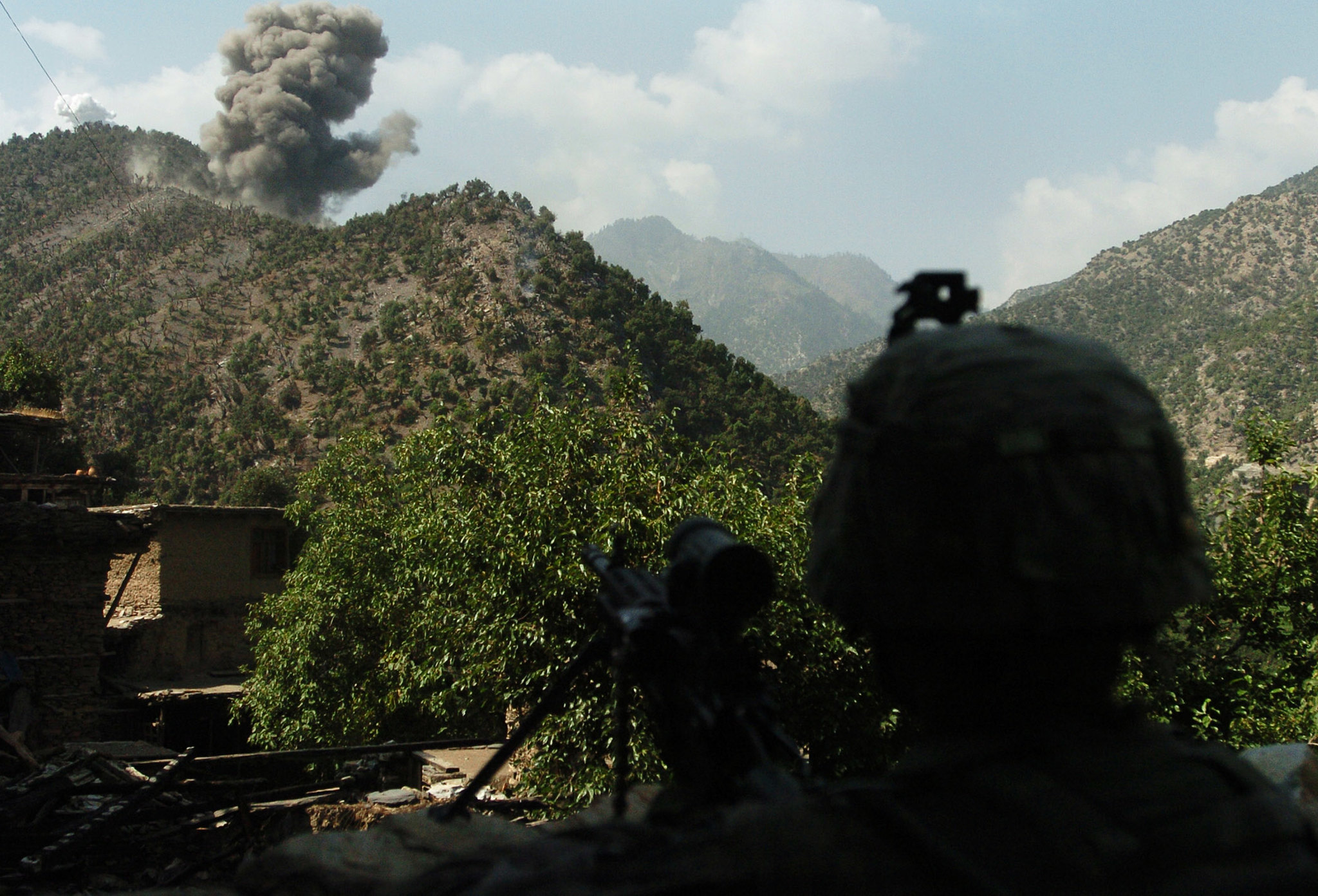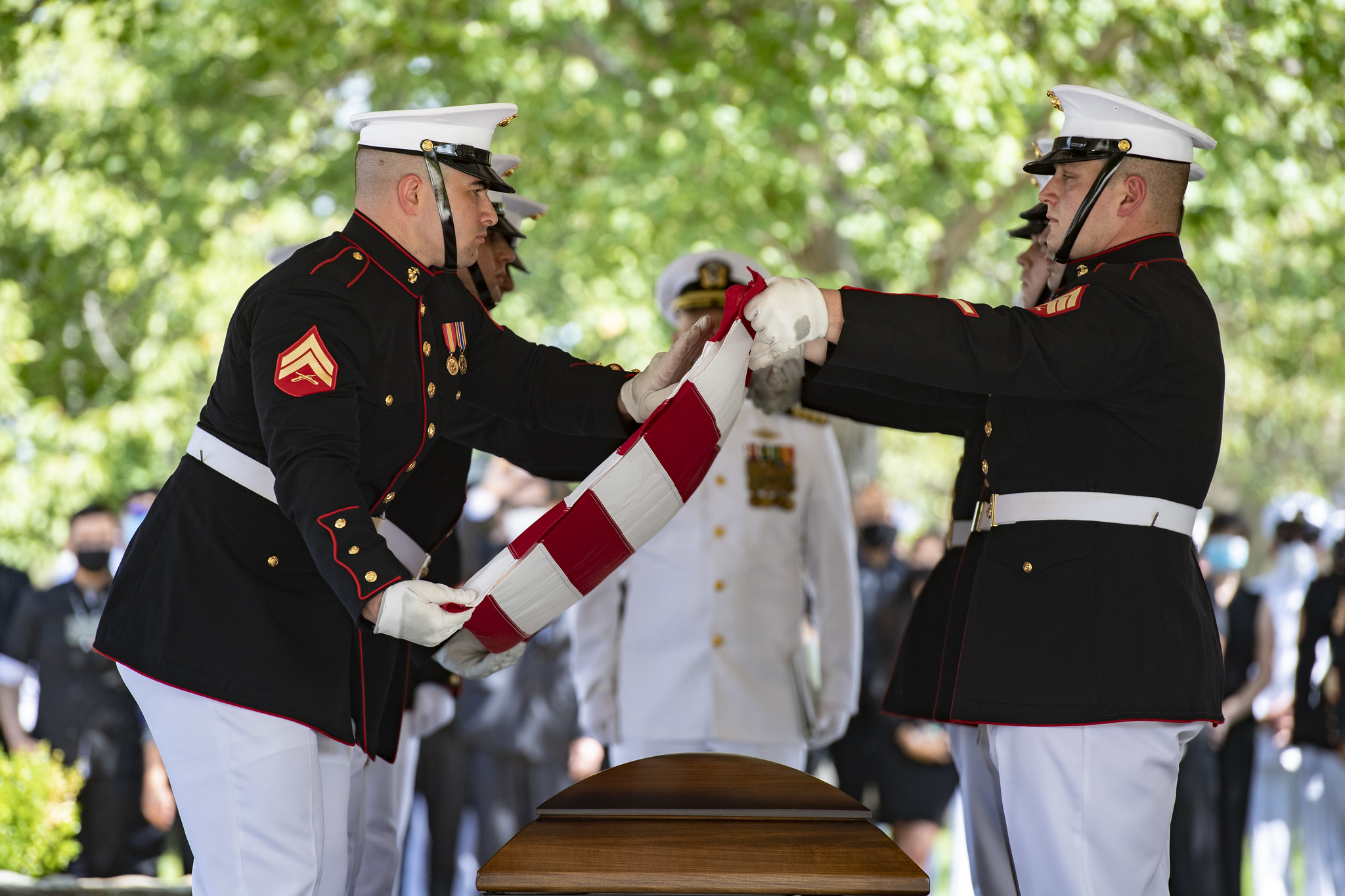Danny Sjursen says that when a war-state is constantly shuffling and substituting enemies it is bound, eventually, to turn on its own citizens.
 Who needs dystopian novelists or absurd satirists when otherwise banal bureaucrats of the U.S. national security state do the job for them? It’s an old story with a new tech-savvy twist.
Who needs dystopian novelists or absurd satirists when otherwise banal bureaucrats of the U.S. national security state do the job for them? It’s an old story with a new tech-savvy twist.
The late great Joseph Heller knew a thing or two about war’s foundational farce. He joined the army air corps at age 19 and flew 60 combat missions as a bombardier on World War II’s Italian front.
In his classic 1961 novel Catch-22, his wounded protagonist lamented that “outside the hospital the war was still going on. Men went mad and were rewarded with medals.”
Yet in today’s confusing modern twist, with the citizenry and even soldiery now opposing America’s endless wars, the only ones going mad are inside Washington. Even now they’re looking for reasons to keep awarding medals to overtaxed and unenthused overseas warriors.
It makes for a strange state of affairs here in year 20 of the crusade formerly known as the “war on terror.” Just last week, two presumably unrelated stories offered case studies (or are they clinics) in America’s national security politics and procedures of absurdity.
Fit for Heller: (Open) Secret Intel Budget
First, there was a passing annual footnote in the Pentagon’s bland bureaucratic budget line.
Part of that military budget goes to what DefenseNews labeled the “Pentagon’s secret intelligence fund” – last year they went with “black intel funding.”
Its officially titled the more mundane Military Intelligence Program, or MIP. Last week’s obligatory announcement was that Congress appropriated $23.1 billion for its operations in fiscal year 2020, a nine-year high.
In fact, the folks on the Hill tacked a $100 million bonus on top of the Pentagon’s request. So super-sleuth are the MIP’s black ops, that the Department of Defense waits until after the fiscal year to admit how many tax dollars unknowingly funded missions the tax-payers aren’t allowed to know about.
It’s a shadowy program by its very nature, separate from the “white-side” National Intelligence Program (NIP), and vaguely described as “defense intelligence activities intended to support operational and tactical level intelligence priorities supporting defense operations.” That’s a 15-word method of saying nothing at all.
Per annual tradition, the Pentagon’s four-sentence statement declared that beyond the top line amount, “No other MIP budget figures or program details will be released, as they remain classified for national security reasons.”
But have no fear, the war department – which hasn’t even eked out a minor war since Mikhail Gorbachev sat in the Kremlin – assures us all that cash “is aligned to support the National Defense Strategy.” After all the abject adventurism and counter-productivity of America’s agents and analysts, this seems explanation feels exceedingly inadequate.

(Wikimedia Commons)
No one is asking for the Pentagon – or the CIA, for that matter – to release info on their sources and methods for stymying still active terror plots. Then again, these days, odds are Langley’s spooks (at least) might do just that if it served the designedly “politically independent” agency’s political interests.
But why aren’t check-writing citizens entitled to more than the current description – which clocks in at $6 billion-per-sentence – of what’s being cashed in their name?
After all, given the hardly distinguished recent track record of America’s 17 intelligence agencies – eight of them within the DOD – a bit more oversight and skepticism seems sensible. Especially since, in any given year, combined intelligence programs account for some 11 percent of the total defense budget.
Call me crazy, but it seems that an Intel community known for their mischievousness can do plenty of mischief carrying a cool $23 billion in unsupervised cash.
Even ex-Captain Joseph Heller might chuckle at a secret intel program too vital not to fund, but too secret to reveal what’s being funded. He might mumble, “That’s some catch, that Catch-2020;” to which a better-read Defense Secretary Mark Esper might quip: “It’s the best there is.”
In other words, trust us. And, after lying on, then botching up, minor matters like 9/11, Iraq’s WMD, torture, Libyan regime change, Syria’s “moderate rebels,” and Russian “bounties” – why oh, why wouldn’t we? The whole thing strikes me as an Obi-Wan Kenobi “These aren’t the droids you’re looking for” mind-trick. Welcome to the Star Wars universe…come to think of it, didn’t Trump recently stand-up a literal Space Force?
Fit for Orwell: ‘Taliban Air Force”
Which brings us to last week’s second textbook profile in absurdity: according to a Washington Post (no, an Onion) headline, “The U.S. is secretly helping the Taliban fight ISIS in Afghanistan.” Beyond their shared commitment to that S-word, the two reports may be more linked than it seems.
That’s because, thanks to a 2019 Congressional Research Service (CRS) report we do have some vague idea of who nets some of those black intel bucks: U.S. Special Operations Command, to pursue “several current acquisition efforts focused on outfitting aircraft — both manned and unmanned, fixed and rotary wing…that will work in multiple environments.”
And guess which outfit has reportedly been surveilling and bombing on the Taliban’s behalf in our impalable 19-year enemy’s fight with the local chapter of ISIS-wannabes? The Joint Special Operations Command (JSOC) counterterrorism task force, of course – which has been “using strikes from drones and other aircraft to help the Taliban.” According to a member of the elite team, “What we’re doing with the strikes against ISIS is helping the Taliban move,” by pinning down or destroying ISIS defenders.
In reality, most foot-soldiers for the “Khorasan Province,” or ISIS(K) of the now defunct Iraq-Syria-centered caliphate aren’t Arab – but disgruntled Afghans (often ex-Taliban), or Pakistani Tehrik-i-Taliban refugees from Islamabad’s crackdown on its own incubated Islamists.
Furthermore, much of the fighting and U.S. airstrike assistance described in recent reports unfolded in Kunar Province’s Korengal Valley – where some 40 U.S. troops have been killed in rather infamous combat over the years.
There, as even WaPo admits, the Taliban, U.S.-backed Kabul government, local criminal gangs, and now ISIS(K), have often really “tussled for control of the Korengal and its lucrative timber business.” It’s about wood as much as Wahhabism.

U.S. Army soldier watching Air Force fighter jets attack insurgent positions in Afghanistan’s Korengal Valley, Aug. 13, 2009. (U.S. Army, Matthew Moeller)
If the U.S. taking and switching sides in a 10,000 miles-from-home lumber war seems strange, remember that what the CIA – these days in tandem with JSOC – lacks in competence it compensates with consistency. Notice that every time – and there’ve been a lot of times – the agency founds or fuels some jihadi Frankenstein’s Monster, it quickly loses control of it.
Then it all but inevitably turns on America or its allies. As if that wasn’t bad enough, another more monstrous splinter or offshoot rises like a problematic Phoenix. This, of course, prompts panic and expedient alliances with the original ogres – themselves threatened by more radical challengers. Only it turns out “enemy of my enemy” friendships rarely endure.
Patient Zero: “American” Iraq
Indeed, Washington – spearheaded by its intelligence agencies and special operators – has a long and sordid history of switching enemies without skipping a beat or bothering to explain. Take just Iraq:
Long before President George H.W. Bush hinted that Saddam Hussein was a Hitler-reprise, the late Sunni-secularist leader of Iraq was seen as a necessary counterweight to revolutionary Iran.

1976: Domes of Imam Reza shrine and Goharshad Mosque at Mashhad, a major city in the former Khorasan and now the capital of Iran’s Razavi Khorasan Province. (Wikimedia Commons)
Presidents Jimmy Carter and Ronald Reagan essentially green-lighted, then definitively backed, Iraq’s 1980-88 invasion of the Islamic Republic. Saddam was our autocrat; that is until he invaded Kuwait in 1990. After a touch of waffling, Bush’s team rhetorically transformed Saddam into the fuhrer himself. Therefore, anything less than a full-fledged U.S.-led counterattack was akin to “Munich” style appeasement.
Just before kicking Saddam’s overrated army out of Kuwait, Bush had perhaps a triumphal flight of fancy and – speaking at a Raytheon plant! – encouraged Iraqi Shia to “take matters into their own hands” and rise up.
Yes, the very same Shia Washington once feared as a potential Iranian Fifth Column. Sure enough, they did revolt; but Bush lost his nerve (or thought better of it) and abandoned them. Saddam slaughtered between 30,000 and 60,000 of them.
In 2003, when Bush’s less-savvy son conquered a country that hadn’t an iota to do with the 9/11 attacks, the once-jettisoned Iraqi Shia were suddenly back in favor. They’d form the democracy’s vanguard for the whole Arab World.
Unfortunately it turned out their leaders largely sprung from expat-Shia Islamist parties, militias and terror outfits. Having sought refuge in Iran – some even fighting against their countrymen in the eight-year war – many were uncomfortably close to their recent hosts. Plenty were a tad too authoritarian, to boot.
By 2005-06, we U.S. military occupiers found ourselves propping-up a corrupt, legitimacy-challenged Shia sectarian regime. American troops were also regularly attacked by Shia militias, various Sunni (nationalist and Islamist) factions, and jihadi foreign fighters.
Bush II’s team finally realized something had to give. So, in a fresh turnabout, the Sunni tribes – many with ample American blood on their hands – were rebranded the “Awakening,” and billed as the next last great hope for democracy on the Tigris.
That let President Barack Obama to tardily pull U.S. troops, but the Shia plurality clung to power and proceeded to sideline and suppress America’s Sunni frenemies.

Military honors performed Aug, 20, 2020, for U.S. Marine Corps Gunnery Sgt. Diego Pongo, who died while supporting Iraqi force in north central Iraq. (Arlington National Cemetery, Flickr)
Boosted by the U.S.-aggravated chaos over Syria’s porous border, Iraq’s Al Qaeda faction (AQI) staged a striking comeback and regained the allegiance of alienated Sunnis.
Radicalized, empowered, and fed on a healthy diet of triumphalist delusions of caliphate grandeur, a significant AQI splinter pronounced itself the Islamic State (ISIS) and ran roughshod over Iraq’s hollow U.S.-raised and -trained army.
After conquering huge swathes of the country’s west/northwest and driving to Baghdad’s outskirts, Iraq’s desperate government announced a wholesale Shia levée en masse – conscripting all comers, who counted a cornucopia of militia loyalties. Many were vaguely aligned with Iran.
Unwilling to see America’s troubled Iraqi progeny go extinct, Obama sent drones, planes, and “non-combat” combat advisors to steady the soldiers of a wavering Iraq and a melange of green militiamen.
The U.S. advisers were advised to avoid getting themselves killed, and stay mute about embarrassing contradictions and cleavages among the sundry Shia cannon-fodder sent to the front. Appearances and all.
By December 2017, when Baghdad’s U.S.-assisted gypsy army had retaken all significant caliphate territory, some 26,000 Iraqi and at least 20 American soldiers had been killed — along with a mid-range estimate of 8,000 civilians killed.
One might think Washington would make nice with its tacit Iranian allies and the Tehran-backed Shia militias after their shared victory over ISIS, then bolt back out of Baghdad. No such luck. Instead the aptly-titled U.S. mission “Inherently Resolved” persisted under the guise of an ISIS-mop-up operations.
The real reason for staying constitutes another American open secret – admitted by hawkish think-tankers, mainstream Democrats and Secretary of State Mike Pompeo, alike: to “balance” and/or “contain” Iran and “reign in” its Shia militias. Of course, the latter only attack U.S. forces because they’re there – uninvited, I’d add. American service members have overstayed their welcome by almost 11 months — Iraq’s parliament voted to expel them last January. Details, mere details.

Speaker of Iraqi Parliament concluding Jan. 5 vote on expelling U.S. troops. (YouTube still)
Finally (for now), in the wake of ISIS’s de facto defeat, its aggressive escalation of tensions with Iran – including assassinating its top general and national icon in Baghdad – and Iraq’s parliamentary expulsion vote, Washington’s tacked back towards the wayward Sunnis and any pliant Shia figureheads willing to work with their sectarian rivals.
One of the “sophisticates” over at the Brookings Institution even recommends the Baghdad government pin its post-ISIS, post-Covid recovery hopes on petro-princelings heading the Sunni Gulf States — the very countries that have long-fueled assorted Islamist groups, including (initially) ISIS itself.
To review Iraq’s cursory case study by the numbers: since 1979, the loosely Shia side has switched from American enemy-to-ally at least four times; the sketchy Sunni squad did so five times and counting.
Orwell in Afghanistan

George Orwell. (Wikimedia Commons)
That’s just one extreme example among many. In other words, there’s plenty of precedent for the Taliban-ISIS(K) swap — and the latter group is itself consequence and outgrowth of counterproductive U.S. policies in Iraq, Syria and Pakistan.
Plus, the merger between ISIS(K) and Tehrik-i-Taliban was a product of Washington’s sometime Pakistani proxies own devil’s bargains.
They raised and fostered Pashtun Islamists to control Afghanistan and harass India’s occupation of Kashmir. When these groups predictably turned on the state, Islamabad’s resultant bloody crackdown sent plenty of fighters to the Afghan hills — whence many offered bayat (loyalty pledge) to the Taliban’s ISIS(K) competitors.
Washington’s and its proxies’ games of ally-enemy musical chairs have almost been too easy. The sad fact that those few citizens keeping tabs and throwing rational barbs have generally been dismissed as cranks and conspiracy theorists counts as proof positive.
Look to the breezy, offhanded nature of JSOC-jocularity. The operators’ inside jokes about serving as the “Taliban’s Air Force” go beyond the standard darkness of soldierly sarcasm. There’s something resignedly fatalistic about their acceptance – almost expectation – of such absurd mission twists.
After all, the more senior leaders among them have likely swapped sides, ditched friends, and befriended ex-enemies a time or two – and on a few continents – during their own careers. According to recent headlines Afghan veteran fathers are now watching their sons deploy to the same war. This grotesque scenario conjures Orwell’s dystopian classic, 1984:
“Winston could not definitely remember a time when his country had not been at war…war had literally been continuous, though strictly speaking it had not always been the same war. The enemy of the moment always represented absolute evil.”
Americans were once told by Reagan that the Soviets represented an absolute “evil empire.”
Therefore helping raise, fund, and arm the Taliban’s Islamist precursors to fight off Moscow’s invasion was deemed obligatory – in fact it had already begun, under Carter. After 9/11, the Taliban – which Washington had long tolerated even as they terrorized the populace – became the new absolute evil incarnate.
We had to win what Bush called, 19 Octobers ago, “a war between good and evil” – and save those embattled Afghan women we hadn’t cared a lick about a few months before.

President Ronald Reagan meeting with leaders of the Afghan Mujahideen, 1983. (Wikimedia Commons)
Only we couldn’t. It took an utterly ridiculous president, Donald J. Trump, to admit as much and try making messy peace instead of endless war with the Taliban. Now the U.S. has not-so-tacitly allied with evil to defeat an ostensibly eviler evil ISIS-K outfit birthed by America’s ludicrous folly in Iraq.
The American people aren’t meant not to notice. Orwell described such matters in 1984 — when Great Britain’s fictional facsimile suddenly switched enemies in its own forever war:
“The past was alterable. The past never had been altered. Oceania was at war with Eastasia. Oceania had always been at war with Eastasia.”
Funny, if – and I’m just spit-balling here, of course – a vocal wing of senior military officers, their now retired superiors-turned-pundits, plus a basically conjoined political-media establishment wanted to indefinitely prolong the Afghan zombie war, shifting its justification to a nasty franchise facsimile of ISIS might seem just the trick. Especially if Trump’s “peace” deal appeared to end U.S. involvement in a wildly unpopular war had rendered Taliban-baiting obsolete. No one much cares about the reigning king of the pundit-generals, H.R. McMaster, and his protestations that the done-deal is (you guessed it!) a “Munich” appeasement “travesty.”
Which raises the question: when do conspiracy theories stop being conspiratorial? Unlike their black budget’s details, the intelligence community’s past policy fiascoes are public record, and they read like broken ones. Time and again the spooks find an enemy to justify their funding and relevance – short of that, they’ll produce or provoke one.
Establishment Republican and Democratic politicians and their media mouthpieces — who are utterly out-of-step rank-and-file — have prolonged the Afghan War and the broader interventionist apparatus that funds it (and their campaigns) for a good while. Even those who once opposed the war now oppose ending it because they don’t like the ender.
Informed citizens ought fear the new U.S.-Taliban anti-ISIS alliance will be used to justify and breathe life into a walking-dead Afghan deployment. Washington’s war-hawks have done it before, and they’ll try it again — regardless of who wins the White House a week from today.
Joking about serving as a Taliban air force is clearly counterintuitive, paradoxical, and absurd — but taken to its logical conclusion it’s also dangerously dystopian. The thing about an empire shuffling and substituting enemies is that eventually the war-state’s shuffled substitute becomes the citizenry itself.
In 1984, the state’s ultimate targets were domestic dissenters like the novel’s protagonist, Winston. Brought before the government’s torturers, he assumes he’s meant to confess but is quickly corrected by the inquisitor:
“We are not interested in those stupid crimes that you have committed. The Party is not interested in the overt act: the thought is all we care about. We do not merely destroy our enemies, we change them.”
After two decades, the America’s military and intelligence forces are clearly incapable of destroying the Taliban, so now Washington may once again change enemies and ally with its old jihadi friends and reminisce about the good old Cold War battles against those bad old Soviets. The real target though, the real audience, is us. Victory for the state isn’t defined militarily anymore — that ship has sailed. True victory comes when the people hardly notice the foe-flipping at all. Changing thought, compliance through apathy — that’s the trick.
In Heller’s classic satirical antiwar novel Catch-22, when the semi-autobiographical protagonist, the bombardier Captain Yossarian, takes shrapnel in the thigh, he awakes to find the lead pilot tending his wound mid-flight. Confused and suddenly struck with growing horror, Yossarian asked “Who’s minding the store?” Though quickly assured that Lieutenant Nately (played by Art Garfunkel in the 1970 film version) was “at the controls” of the soaring bomber, it’s clear that Heller — through Yossarian — was really asking about the cockpit of the broader war. And so, should we still.
Whether it’s the annual furtive funding gymnastics or another round of friend-foe contortionism in Afghanistan, such stories never fail to engender head shakes at my youthful naïveté.
Back when, at 17, I followed uncritical patriotism, aspirational masculinity and visions of martial glory to West Point – and for much of the next five years – whenever a U.S. policy seemingly failed efficacy or ethics tests, I, like most Americans, assumed some “they” must know something a Main Street “we” didn’t. Trust the process and policy, no matter how strange, became way of life and sanity-defense mechanism.
I wanted to believe, needed to believe – even in the face of mounting evidence of early blunders and own goals – that some omniscient and benevolent insiders were manning the nation’s controls. In my case, the delusion had an expiration date of October 2006 — as I took the reins in tiny sub zones of treacherous backwater sub-districts of Southeast Baghdad.
It’s remarkable how stark a turnabout can result from fighting two wars (Afghanistan and Iraq) sold and waged on lies, watching two others (Libya and Syria) born of the same, plus launching countless raids against innocents – instigated by embarrassingly bad intel. What first I feared, then suspected, and finally knew at ground-level applies to the aggregate — and Americans ought learn it fast:
Whether in Washington, Arlington, or Langley – there are no adults “in the room“…or minding the store.
Danny Sjursen is a retired U.S. Army officer and contributing editor at antiwar.com. His work has appeared in the LA Times, The Nation, Huff Post, The Hill, Salon, Truthdig, Tom Dispatch, among other publications. He served combat tours with reconnaissance units in Iraq and Afghanistan and later taught history at his alma mater, West Point. He is the author of a memoir and critical analysis of the Iraq War, Ghostriders of Baghdad: Soldiers, Civilians, and the Myth of the Surge. His latest book is Patriotic Dissent: America in the Age of Endless War. Follow him on Twitter at @SkepticalVet. Check out his professional website for contact info, scheduling speeches, and/or access to the full corpus of his writing and media appearances.
This article is from Antiwar.com.
The views expressed are solely those of the author and may or may not reflect those of Consortium News.
Please Contribute to Consortium News
Donate securely with
Click on ‘Return to PayPal’ here.
Or securely by credit card or check by clicking the red button:

 By
By 

Yes.
Thank you again, Danny. “Straight shooting” from you as always.
This is an inspired piece. Thanks, Danny. It matches my own experience as a reporter of America’s wars. My question is this: why are my notebooks full of renegades like Danny: from the military, the CIA, the State Dept, the Pentagon, and so on? Americanism (not ‘anti communism’!) has been the blight of my era, yet those who ‘turn’ and tell us why are invariably Americans from ‘within’.
Makes one wonder if chaos was not the goal in the first place ,with CIA running the show.
That conclusion is hard to escape, since it all keeps OUR national treasure pouring into the pockets of the MIC. Which is where Mr. Sjursen began this piece…
Just covert but ‘in yo face’ permanent war. That choice was made back at the end of WW II by the efforts of George Kennan and especially James Forrestal. With Allen Dulles as ever incessantly pulling the strings.
The options were on the table: world peace and cooperation, sharing of the atomic bomb up front, or permanent war as a means of ‘preserving’ both the ‘peace’ and the economy. The Great Depression’s grip was never truly broken throughout the 1930s, it was fits and starts up until Pearl Harbor. The Humpty-Dumpty Syndrome was all capitalism had until the USA was all-in.
The Dems knew in 1944 that Roosevelt wasn’t long for this world, that’s why it was so important to dump Henry Wallace from the VP slot. Enter “The buck stops here” Harry Truman, a pliable little Midwest nobody who wasn’t even aware of the Manhattan Project’s atomic bomb program, but oh was he willing to use it at the behest of the hawks with the blood in their eye.
To think we came so close to living an actual alternate history with a potentially game-changing-for-mankind’s benefit scenario.
And then to ponder Churchill’s ‘Operation Unthinkable’ and be at least somewhat mollified and relieved that Truman didn’t bite that apple that would have had the Western contingent of the Allies marching with menace to subdue Moscow.
Our luck ran out with FDR’s death and Wallace’s coup beforehand. Permanent war was the choice made as a result.